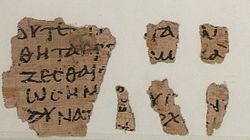Papyrus 128 (in the Gregory-Aland numbering), designated by 𝔓128, is a copy of a small part of the New Testament in Greek. It is a papyrus manuscript of the Gospel of John, containing verses 9:3-4; 12:16-18. The manuscript paleographically has been assigned to the 6th or 7th century.
| New Testament manuscript | |
 Fragments containing John 9:3-4 | |
| Sign | 𝔓128 |
|---|---|
| Text | John 9:3–4, 12:16–18 |
| Date | 6th–7th century |
| Script | Greek |
| Found | Monastery of Saint Epiphanius, Egypt |
| Now at | Metropolitan Museum of Art |
| Type | ? |
| Category | none |
It was formerly listed as a part of Papyrus 44. Both are currently housed at the Metropolitan Museum of Art (Inv. 14. 1. 527) in New York.
Text
editJohn 9:3–4
ουτε οι γ[ονεις αυτου αλλ ινα φανερω]
θη τα εργ[α του θυ εν αυτω εμε δει εργα]
ζεσθαι τ[α εργα το]υ π[εμψαντος με ε]
ως ημ[ερα εστιν ε]ρχ[εται νυξ οτε ουδεις]
δυνατ [...]
John 12:12–13
[...]ερ[χεται ο ις εις ιεροσολυμα ελαβον τα
β]αϊα [...]
John 12:16–18
ε[ν]α και [ταυ]
[τα εποιησαν αυτω εμαρτυρει] ουν ο οχλο[ς
ο ων μετ αυτου] οτε [τον λαζαρο]ν εφων[η]
[σεν εκ του μνημ]ειο[υ και ηγειρ]εν αυτον
[εκ νεκρων δια τουτο και υπηντ]ησεν α [– – –]
See also
editFurther reading
edit- W. E. Crum, H. G. Evelyn-White, The Monastery of Epiphanius at Thebes, Metropolitan Museum of Art, Egyptian Expedition Publications IV, (New York, 1926), pp. 120–121. (transcription and collation).
- Ellwood M. Schofield, The Papyrus Fragments of the Greek New Testament, Southern Baptist Theological Seminary, Louisville, 1936, pp. 296–301.
External links
edit- Papyrus 128 at the Metropolitan Museum of Art, accession number 14.1.527
- A Transcription of John in P128 by the International Greek New Testament Project
- Media related to Papyrus 128 at Wikimedia Commons